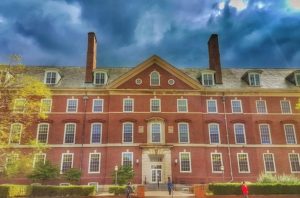What’s the Point of a Professor?
When he was a student in the early 1980s, Emory University English professor Mark Bauerlein and his peers spoke with their professors regularly and at length, knowing “that these moments were the heart of liberal education.” Today, polls show, one-third of students never do so. epSos.de (CC BY 2.0)
epSos.de (CC BY 2.0)
When he was a student in the early 1980s, Emory University English professor Mark Bauerlein and his peers spoke with their professors regularly and at length, knowing “that these moments were the heart of liberal education.” Today, polls show, one-third of students never do so.
Bauerlein is the author of the book “The Dumbest Generation: How the Digital Age Stupefies Young Americans and Jeopardizes Our Future (or, Don’t Trust Anyone Under 30).” That title will no doubt anger many people, but because the technological and other forces that shape the development of personality have changed profoundly over the past 30 years, its thesis should probably be dealt with rather than dismissed and ignored.
Bauerlein writes in The New York Times:
In our hunger for guidance, we were ordinary. The American Freshman Survey, which has followed students since 1966, proves the point. One prompt in the questionnaire asks entering freshmen about “objectives considered to be essential or very important.” In 1967, 86 percent of respondents checked “developing a meaningful philosophy of life,” more than double the number who said “being very well off financially.”
Naturally, students looked to professors for moral and worldly understanding. Since then, though, finding meaning and making money have traded places. The first has plummeted to 45 percent; the second has soared to 82 percent.
I returned to U.C.L.A. on a mild afternoon in February and found the hallways quiet and dim. Dozens of 20-year-olds strolled and chattered on the quad outside, but in the English department, only one in eight doors was open, and barely a half dozen of the department’s 1,400 majors waited for a chance to speak.
When college is more about career than ideas, when paycheck matters more than wisdom, the role of professors changes. We may be 50-year-olds at the front of the room with decades of reading, writing, travel, archives or labs under our belts, with 80 courses taught, but students don’t lie in bed mulling over what we said. They have no urge to become disciples.
“Sadly, professors pressed for research time don’t want them, either,” Bauerlein continues. “As a result, most undergraduates never know that stage of development when a learned mind enthralled them and they progressed toward a fuller identity through admiration of and struggle with a role model.”
Continue reading here.
— Posted by Alexander Reed Kelly.
Your support matters…Independent journalism is under threat and overshadowed by heavily funded mainstream media.
You can help level the playing field. Become a member.
Your tax-deductible contribution keeps us digging beneath the headlines to give you thought-provoking, investigative reporting and analysis that unearths what's really happening- without compromise.
Give today to support our courageous, independent journalists.






You need to be a supporter to comment.
There are currently no responses to this article.
Be the first to respond.